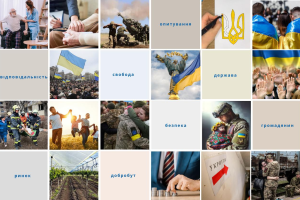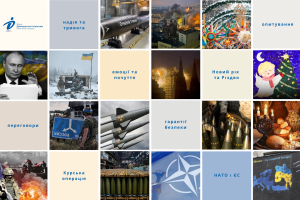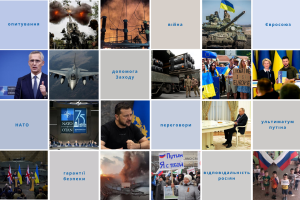This nationwide study was conducted jointly by the Ilko Kucheriv Democratic Initiatives Foundation and the Razumkov Center sociological service on December 19-25, 2018, in all regions of Ukraine region except for Crimea and occupied territories of Donetsk and Luhansk oblasts. A total of 2,017 respondents were polled age 18 and over. The theoretical sample error does not exceed 2.3%.
Funding for the nationwide survey was provided by the MATRA project of the Royal Dutch Embassy in Ukraine.
The regional public opinion study was conducted in the Donetsk and Luhansk oblasts (on territory that is controlled by Ukraine) by the Ilko Kucheriv Democratic Initiatives Foundation (using the network of the Ukrainian Sociology Service firm) on October 15-25 (Donetsk oblast) and on November 1-11, 2018 (Luhansk oblast) . In every oblast, 500 respondents were polled based on a sample that represents the adult population of the oblasts (with the exception of occupied territories). The sample is representative of such indicators as sex, age, education and place of residence. The theoretical sample error does not exceed 3.5%.
The regional survey was conducted within the framework of the project “Moving forward the peace process in the Donbas: increasing inclusiveness of the local communities in the potential peace making mission and fostering local ownership of possible peace initiatives” and with financial support from the Embassy of Canada in Ukraine.
The majority of Ukrainian citizens share the idea that there is currently an ongoing war between Ukraine and Russia (72%). This view is most widespread in the western (91%) and central (79%) regions. In the south, this view is held by 62%, and in the east – by 47%. Nearly every fifth person in these regions was undecided in responding to this question. The public opinion study in the Ukraine-controlled part of the Donbas found that the views of this region’s residents were essentially split in half – 39% believe that currently there is an ongoing war between Ukraine and Russia, and 40% say there is isn’t.
50% of Ukrainian citizens agree that for the sake of peace in the Donbas, it is worth to accept compromises with Russia and the self-proclaimed republics, but not all of them; only 16% are for any kind of compromises. Seventeen percent of Ukrainians support the use of force to resolve the conflict. Among Donbas residents there is a significantly higher level of readiness to find any kind of compromises to achieve peace (46%), and also less support for a forcible solution to the conflict (10%).
At the same time, Ukrainian citizens find the majority of possible compromises that are discussed publicly and provided for by the Minsk agreements as unacceptable. The least acceptable ones for Donbas residents, and for Ukrainian citizens overall, is the conduct of elections under the conditions of militants, amnesty for all combatants who fought against the Ukrainian army, and forming law enforcement bodies in the non-government controlled areas exclusively with local representatives. For Donbas residents, as well as for those in the southern and eastern regions of Ukraine, the most acceptable compromises are for giving “special status”to the non-government controlled areas, giving the Russian language official state, adopting a law on neutrality and non-aligned status for Ukraine, and restoring trade with the occupied territories.
Most Ukrainians believe that the most effective measures for achieving peace is to restore a normal life in the liberated territories (30%) and international pressure on Russia (32%). For Donbas residents, the main way to establish peace is restoring a normal life in the Ukraine-controlled territories (48%). 18% of respondents consider putting pressure on Russia in the form of sanctions as a necessary step for achieving peace. Compared to overall moods in Ukraine, people in the Donbas prefer such measures as, giving the occupied territories “special status” within Ukraine (24%) and making Russian an official state language (19%). The region’s citizens also more often, compared to Ukraine overall, believe measures of a social and humanitarian nature are appropriate such as, simplifying procedures for crossing the line of contact, social payments for residents of the occupied territories and trade with these territories.
Close to half of citizens in Ukraine overall and in the Ukraine-controlled part of Donbas prefer returning the occupied territories to pre-war conditions. Nearly 20% of Ukrainian citizens and 28% of Donbas residents see them as part of Ukraine, but more independent from the central government. It should be emphasized that neither Donbas nor Ukraine overall support independence for these territories or them being a part of Russia. In the Donbas, only 1.7% wanted to see “DPR” and “LPR” as independent states and 1.6% as part of Russia. However, Donbas residents assessed the likelihood of getting the occupied territories back ambiguously: 25% believe in their return in the next five years, another 25% – in the long-term prospective, and 17% believe it is impossible to return these territories to Ukraine.
The chances for having a U.N. peacekeeping mission in the occupied territories is most supported in the western (73%) and central (66%) regions, and considerably less in the southern (50%) and eastern (23%) regions as well as in the Donbas (30%). However, should there be a peacekeeping force, the majority of citizens are of the opinion that the peacekeepers should be stationed throughout the occupied territories up to the border with Russia and not only along the line of contact.
Forty-nine percent of Donbas residents believe that Russia is a party to the conflict in eastern Ukraine; 27% disagree with this opinion and 24% didn’t respond to this question. At the same time, a third of Donbas residents are convinced that Russia sends arms to the “DPR” and “LPR”, 27% say that Russia controls all the political and military actions of the self-proclaimed republics, and 23% say that Russian army fights on the self-proclaimed republics’ side. Another 24% mentioned humanitarian assistance from Russia to the Donbas.
The principal blame on what is currently happening in the Donbas, 57% of Donbas residents place on the current Ukrainian government, another 33% blame the previous regime of Viktor Yanukovych, 24% on the Maidan, 22% on Russia, 19% on the U.S., and 14% on the militants who used arms to seize power.
To resolve the conflict, citizens who live in the Donetsk and Luhansk oblasts more often place hope on the presidential candidate whom they support in the next elections (26%), on the Ukrainian people (24%), Armed Forces of Ukraine (14%) and incumbent Ukrainian President Petro Poroshenko (12%).
The main sources of information on events in the Donbas for the region’s residents is watching Ukrainian television channels (63%), online sources (47%), family, friends and acquaintances (41%) and social media networks (29%). Russian TV channels are watched by 16% of citizens, and another 15% get information in the local press.








